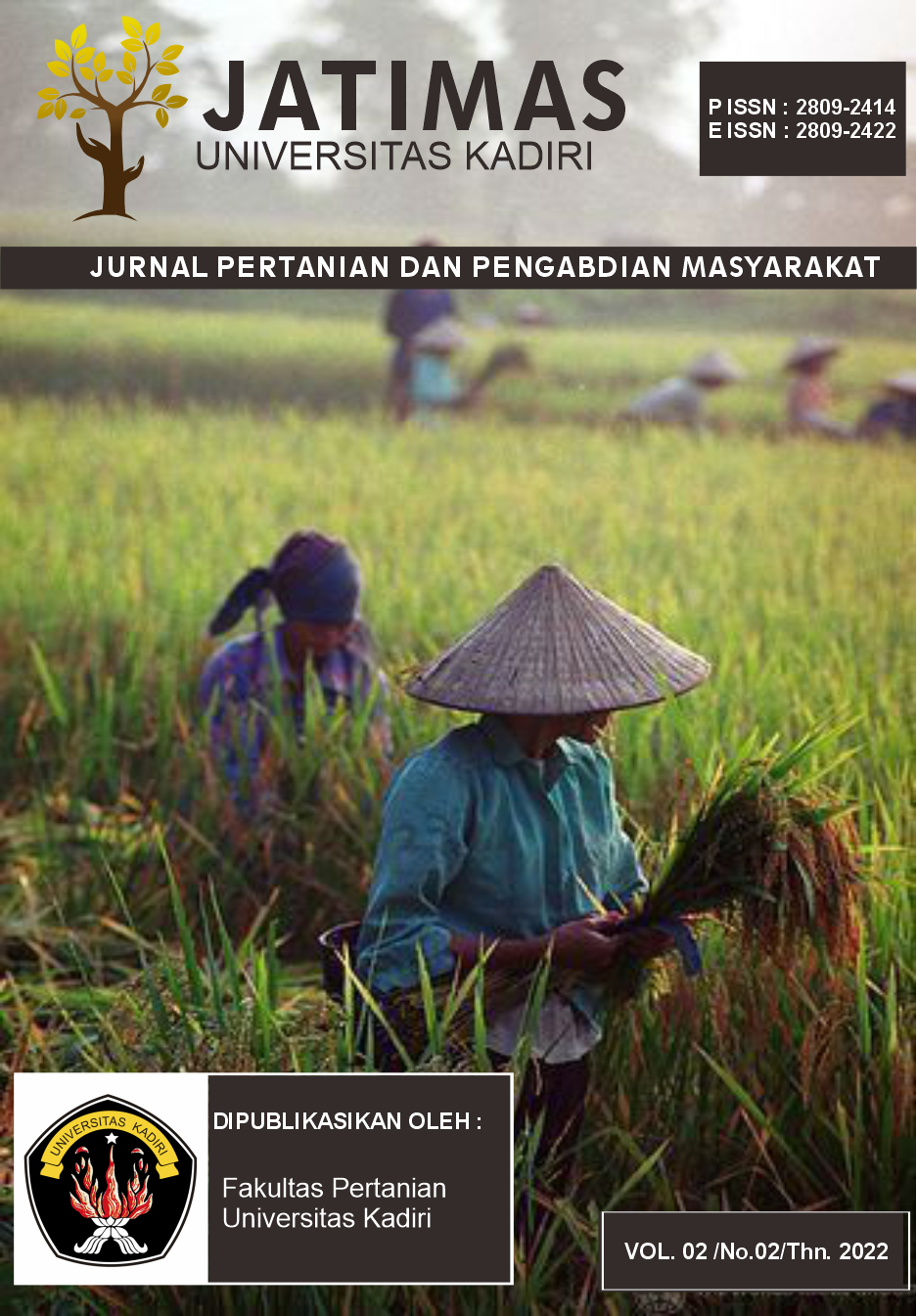Pelatihan Intensif Produk Dendeng Babi Asap Sebagai Pengembangan Potensi Desa Panji, Buleleng, Bali
DOI:
https://doi.org/10.30737/jatimas.v2i2.3446Keywords:
Panji Village, Pork, Smoked Pork JerkyAbstract
Pork is one of the potentials of Panji Village, which is managed by the community into various preparations, one of which is smoked beef jerky. Badan Usaha Milik Desa (BUMDes), or Village Enterprises, of Panji Village, makes this smoked pork jerky processed product a specialty and souvenir of Panji Village. However, this smoked pork jerky still has a weak shelf life, so it does not last long to be used as a souvenir product. This activity aimed to provide knowledge about processing smoked pork jerky with a long shelf life to related production groups. The method used in carrying out this activity consisted of surveys and interviews about the processing of smoked beef jerky that had been carried out, followed by the presentation of material related to the shelf life of jerky by the Department of Agriculture and Food Security of the Province of Bali. The two activities were carried out on different days. The participants of this activity were women from the beef jerky production group in Panji Village. Based on the results of the survey after education and simulation were carried out, it was discovered that 86.7% of the participants agreed that this activity was highly beneficial for the development of processed products of smoked pork jerky. The activity participants understood the material provided and were ready to apply it in the subsequent production of smoked pork jerky.
Â
Daging babi menjadi salah satu potensi dari Desa Panji yang dikelola oleh masyarakatnya menjadi berbagai olahan, salah satunya dendeng asap. Badan Usaha Milik Desa (BUMDes) di Desa Panji menjadikan produk olahan dendeng babi asap ini menjadi produk unggulan dan oleh-oleh khas Desa Panji. Meski demikian, dendeng babi asap khas Desa Panji ini masih memiliki kelemahan pada umur simpan yang tidak tahan lama untuk dijadikan produk oleh-oleh. Kegiatan ini bertujuan memberikan pengetahuan serta keterampilan tentang pengolahan dendeng babi asap dengan umur simpan yang awet kepada kelompok produksi terkait. Metode yang digunakan dalam melaksanakan kegiatan ini terdiri dari survei dan wawancara tentang pengolahan dendeng asap yang telah dilakukan. Penyampaian materi berkaitan dengan umur simpan dendeng oleh Dinas Pertanian dan Ketahanan Pangan Provinsi Bali. Kedua kegiatan tersebut dilakukan pada hari yang berbeda. Peserta kegiatan ini adalah ibu-ibu dari kelompok produksi dendeng di Desa Panji. Berdasarkan hasil survei setelah dilakukan edukasi diketahui bahwa sebesar 86.7% peserta kegiatan mengatakan bahwa kegiatan ini sangat bermanfaat karena memberikan pemaparan mengenai pengolahan dendeng babi asap agar memiliki umur simpan yang lebih lama kepada Kelompok Wanita Tani (KWT) selaku produsen. Sedangkan 13.3% lainnya mengatakan kegiatan ini belum bermanfaat secara berarti karena dilakukan secara presentasi, bukan praktik. Peserta kegiatan telah memahami materi yang diberikan dan siap untuk menerapkannya dalam produksi dendeng babi asap selanjutnya. Berdasarkan pelatihan ini, diberikan hibah alat produksi berupa oven untuk pengeringan sebelum menggunakan asap guna memaksimalkan umur simpan dendeng babi asap.
References
Astrini, D. (2021). Dampak Partisipasi Anggota Kelompok Wanita Tani Terhadap Kesejahteraan Keluarga. Jurnal Ilmiah Manajemen Kesatuan, 9(2). https://doi.org/10.37641/jimkes.v9i2.769
Bakaruddin. 2008. Perkembangan dan Permasalahan Kepariwisataan. Padang:UNP Press
D’Souza, M. S., O’Mahony, J., & Achoba, A. (2022). Exploring Foot Care Conditions for People Experiencing Homelessness: A Community Participatory Approach. Journal of Primary Care and Community Health, 13. https://doi.org/10.1177/21501319211065247
Djadjuli, R. D. (2018). Peran Pemerintah Dalam Pembangunan Ekonomi Daerah. Jurnal Dinamika: Jurnal Ilmiah Ilmu Administrasi Negara, 5(2).
Hodijah, S., Parmadi, P., Hastuti, D., Mustika, C., & Syafi’i, S. (2021). Pemberdayaan Perempuan Melalui Peningkatan Agroindustri Kecil Olahan Ubi Jalar (Studi Desa Renah Alai Kecamatan Jangkat Kabupaten Merangin). Studium: Jurnal Pengabdian Kepada Masyarakat, 1(2). https://doi.org/10.53867/jpm.v1i2.24
Ina, Y. T., & Sirappa, I. P. (2021). PEMANFAATAN CAIR TEMPURUNG KELAPA DAN PENGARUHNYA TERHADAP ORGANOLEPTIK DAN KIMIAWI DAGING SAPI. Jurnal Peternakan Nusantara, 7(1). https://doi.org/10.30997/jpn.v7i1.4075
Indrawati, U. S. Y. V., Endang, N., & Asriati, N. (2018). PENINGKATAN KEMANDIRIAN USAHA KECIL DAN MENENGAH MELALUI PENDAMPINGAN PROGRAM KKN-PPM. Buletin Udayana Mengabdi, 17(3). https://doi.org/10.24843/bum.2018.v17.i03.p04
Paramartha, G. Y., Sukaatmadja, I. P. G., & Sri Astiti, N. W. (2017). PENENTUAN KOMODITAS UNGGULAN PERTANIAN BERDASARKAN NILAI PRODUKSI DI KABUPATEN BULELENG. JURNAL MANAJEMEN AGRIBISNIS (Journal Of Agribusiness Management), 5(2). https://doi.org/10.24843/jma.2017.v05.i02.p07
Sa’diyah, N. (2019). Cookies klepon pelangi dalam rangka modernisasi makanan tradisional yang tahan lama. Semantic Scholar.
Suwena, I. K., & Arismayanti, N. K. (2017). Green Tourism Development as Community Empowerment Efforts in Pemuteran Village, Buleleng, Bali. Udayana Journal of Social Sciences and Humanities (UJoSSH), 1(1). https://doi.org/10.24843/ujossh.2017.v01.i01.p19
Yuendini, E. P., Rachmi, I. N., Nurul, N., Puspitasari, A., & Harini, R. (2019). Analisis Potensi Ekonomi Sektor Pertanian dan Sektor Pariwisata di Provinsi Bali Menggunakan Teknik Analisis Regional. Jurnal Geografi, 16(2).
Downloads
Published
Issue
Section
License
Authors who publish in this journal agree to the following terms:
- Authors retain copyright with the work simultaneously licensed under a Creative Commons Attribution License (https://creativecommons.org/licenses/by-nc-nd/4.0/) that allows others to share the work with an acknowledgement of the work's authorship. Permitted third-party reuse is defined by the Creative Commons Attribution-NonCommercial-NoDerivs (CC BY-NC-ND). This permission allows users to copy and distribute the Article, provided this is not done for commercial purposes and further does not permit distribution of the Article if it is changed or edited in any way, and provided the user gives appropriate credit (with a link to the formal publication through the relevant DOI), provides a link to the license, and that the licensor is not represented as endorsing the use made of the work.
- Authors are able to enter into separate, additional contractual arrangements for the non-exclusive distribution of the journal's published version of the work (e.g., post it to an institutional repository or publish it in a book).
- Authors are permitted and encouraged to post their work online (e.g., in institutional repositories or on their website) prior to and during the submission process, as it can lead to productive exchanges, as well as earlier and greater citation of published work.
Deprecated: json_decode(): Passing null to parameter #1 ($json) of type string is deprecated in /home/ojs.unik-kediri.ac.id/public_html/plugins/generic/citations/CitationsPlugin.php on line 68



